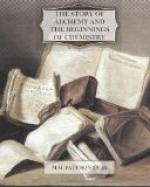Fig. XIV. p. 93, is interesting; it is an apparatus for rectifying spirits, by distilling, and liquefying only the most volatile portions of the distillate. The spirituous liquor was heated, and the vapours caused to traverse a long zigzag tube, wherein the less volatile portions condensed to liquid, which flowed back into the vessel; the vapour then passed into another vessel, and then through a second zigzag tube, and was finally cooled by water, and the condensed liquid collected. This apparatus was the forerunner of that used to-day, for effecting the separation of liquids which boil at different temperatures, by the process called fractional distillation.
We should never forget that the alchemists were patient and laborious workers, their theories were vitally connected with their practice, and there was a constant action and reaction between their general scheme of things and many branches of what we now call chemical manufactures. We may laugh at many of their theories, and regret that much useless material was accumulated by them; we may agree with Boyle (end of 17th century) when he likens the “hermetick philosophers,” in their search for truth, to “the navigators of Solomon’s Tarshish fleet, who brought home from their long and tedious voyages, not only gold, and silver, and ivory, but apes and peacocks too; for so the writings of several of your hermetick philosophers present us, together with divers substantial and noble experiments, theories, which either like peacocks’ feathers make a great show but are neither solid nor useful; or else like apes, if they have some appearance of being rational, are blemished with some absurdity or other, that, when they are attentively considered make them appear ridiculous.” But however we may condemn their method, because it rested on their own conception of what the order of nature must be, we cannot but praise their assiduity in conducting experiments and gathering facts.
As Bacon says, in De Augmentis Scientiarum:
“Alchemy may be compared to the man who told his sons that he had left them gold buried somewhere in his vineyard; where they by digging found no gold, but by turning up the mould about the roots of the vines, procured a plentiful vintage. So the search and endeavours to make gold have brought many useful inventions and instructive experiments to light.”
CHAPTER VII.
THE LANGUAGE OF ALCHEMY
The vagueness of the general conceptions of alchemy, and the attribution of ethical qualities to material things by the alchemists, necessarily led to the employment of a language which is inexact, undescriptive, and unsuggestive to modern ears. The same name was given to different things, and the same thing went under many names. In Chapter IV. I endeavoured to analyse two terms which were constantly used by the alchemists to convey ideas of great importance,




